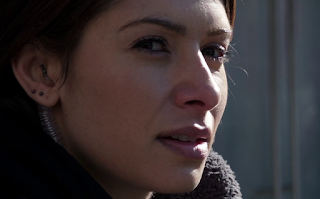When we think of "Asian-American" characters, we tend to default to images of East Asian actors and actresses. If we're being particularly broad-minded we can usually be called on to remember including the Indian sub-continent and South Asians in there, and every once in a while we remember to toss in a few South-East Asians or Oceanic Asians. But only a couple.
Heck, even for a site committed to diversity, we here at KMWW haven't done a spectacular job at representing Asian diversity so far this Asian-American and Pacific Islander heritage month. We've looked at the two different sides of the "Asian best friend" trope with a Korean character (Lane Kim from Gilmore Girls) and an Indian character (Connie Maheswaran from Steven Universe), but we've been remiss in going broader afield to talk about the wider Asian-American experience.
I mean, Asia's a pretty big place. Kind of the biggest, if you think about it.
That's why today we're stepping a little bit out of our comfort zone and discussing a different kind of Asian-American character, one who faces a lot of stereotypes and assumptions and preconceived notions but who rarely gets included in discussions of what it means to be Asian. Today we're talking about Person of Interest's own Sameen Shaw, a Persian/Iranian woman who is, yes, Asian.*
Now Shaw is a fascinating character for a lot of reasons, few of which have anything to do with her racial background. She's a former doctor turned wet works agent, and she has a personality disorder. She's bisexual and lost her parents at a young age. She can get shot in the stomach and stone-faced dig the bullet out herself, all while monologuing to the villain she tied up in a corner.
Oh, and she really likes kids but she doesn't want you to know that she likes kids. Also dogs. Her most recent character arc on the show has a level of complexity and nuance that puts the Winter Soldier storyline in the Captain America movies to shame, and that's coming from me.
In other words, Sameen Shaw is a fantastically complex and interesting character and I could write a whole article on her without even touching her family background. But that wouldn't be entirely fair to her either. As we learn from the show, Shaw is actually really proud of her background. She speaks Farsi and celebrates Persian New Year (Nowruz).
She speaks lovingly of her mother, who fled terrorists in Iran and came to make a new life in America. We don't know for sure if her father was also Persian, but either way, Shaw's identity as a Persian-American woman means a great deal to her, and so it should mean a great deal to us.
Here's the thing: when we talk about the stereotypes that afflict Asian-American female characters, we tend to be talking about stereotypes that afflict East Asian female characters. We tend to focus our discussions on things like geisha and dragon-lady and tiger-mom stereotypes, which is valid and good and necessary to discuss.
These stereotypes are harmful and pervasive and need to be talked about. But it's much rarer for us (and I include myself in this diagnosis) to take a hard look at the tropes that affect Asian-American characters from different parts of Asia. As an Asian-American woman, Shaw never really has to face being called a "dragon lady". But she does have to face being called a "terrorist" or a "harem hottie". And that's worth talking about too.
But before we talk about that, let's take a quick refresher and talk about Person of Interest as a show.
So Person of Interest is a CBS series currently finishing out its fifth and last season. It takes a slightly outlandish premise and spins it into a fantastic story about surveillance and big government and paranoia and finding a family where you least expected it. It's great. Really. And it's only gotten better since Edward Snowden released the NSA files that proved this series wasn't nearly as far-fetched as we all had hoped.
The premise is this: there is a machine that takes all the data about you on the web and on surveillance footage and tracks it. It's supposedly looking for terrorists, but really it's looking for violent activity - any violent activity. This Machine sees everything and knows everything. From your fifth birthday to what you put in your pockets this morning, it knows, and it uses this information to predict what you will do. It's unparalleled in doing so and has helped stop any number of major terrorist attacks.
 Those are our heroes and the ones that we track - the Machine's creator, Harold Finch (Michael Emerson), and his "assistant", John Reese (Jim Caviezel). They take the information the Machine gives them - just the social security number of a "person of interest" - and use it to stop crimes. That's basically the show.
Those are our heroes and the ones that we track - the Machine's creator, Harold Finch (Michael Emerson), and his "assistant", John Reese (Jim Caviezel). They take the information the Machine gives them - just the social security number of a "person of interest" - and use it to stop crimes. That's basically the show.How does Shaw work into all of this? Well, when we meet Sameen Shaw (Sarah Shahi) in the second season, it's because her number has come up.
An intelligence agent working for the US, Shaw's job is actually enforcing all the "relevant" - as in relevant to national security - information that the Machine provides. But some of the information has been fabricated and created to push forward other American interests. Shaw has stumbled into an awareness of this corruption, and so she has to be taken out. Needless to say, that doesn't work.
For a while Shaw is in the wind as a burned spy, but it's not long before she finds herself on "Team Machine", getting numbers and saving people. She even comes to view the people around her, Finch and Reese and even the wayward Root (Amy Acker), as her family. And she really loves the dog.
As the show progresses, though, the story gets more and more complex. There are twists and turns and increasingly Orwellian plots, with Shaw often at the center of it all. The third season sees the rise of a second all powerful machine, this one called Samaritan, and the fourth season has our heroes hiding out from a system of surveillance they can no longer control or hide from. Shaw finds herself clerking a counter at Bloomingdales by day and working with cut-rate thieves by night, frustrated that her life of unbridled badassness has brought her to this.
 Anyway. Shaw's character growth throughout these seasons is really worth looking at, because it highlights how even as a character with an Axis-II personality disorder, Shaw is still capable of growing and loving and contributing to a community. It's a story we very rarely see, following a woman whose emotions are "all turned down really low" as she nevertheless finds value and meaning in helping people and caring for them.
Anyway. Shaw's character growth throughout these seasons is really worth looking at, because it highlights how even as a character with an Axis-II personality disorder, Shaw is still capable of growing and loving and contributing to a community. It's a story we very rarely see, following a woman whose emotions are "all turned down really low" as she nevertheless finds value and meaning in helping people and caring for them. Even more, she goes from a place of complete isolation to one of full investment in a family group. She's even in a loving and committed romantic relationship, something she herself wasn't sure she was capable of.
Shaw really hits the "diverse character" bingo, if that were a thing. She's a neuroatypical bisexual woman of color. I mean, wow. And yet none of those identities feel ancillary to her character, nothing feels tacked on just for the diversity points, nothing is wasted. It's all just part and parcel of who she is, and that person is freaking awesome.
Okay, so what does all of this have to do with Shaw's identity as an Asian-American woman? It's great that she's such a well-rounded and appealing female character and all, but does it matter that she's also specifically Asian-American? Would this story have been in any way different if Shaw were white?
Yes. Yes it would.
It is very significant that this character, who has slowly become the central character for the whole dang show, is Persian, is Asian-American, is a woman of color. It's important because so much of the show is about how the interests of regular people and ordinary citizens can be abused when governments seek to increase "protection" by decreasing privacy. In other words, it is really thematically resonant that one of the people fighting against government overreach here is a Persian woman whose mother fled a repressive regime in Iran.
That's what we're getting at. It matters that Shaw becomes our hero, our champion of the right to live as we choose and not be caged in by the State, because of her family history and background. It matters that Shaw fight back against the government she once served, not just because she's Persian, but also because because she's a first generation immigrant. She's from a family that chose America, that chose to come here and start a new life in the shadow of tragedy.
Shaw is American, very American, and that makes her the perfect figure to fight back against an American government gone wrong.
 As for the stereotypes she faces, there's something satisfyingly twisty about having Sameen Shaw fighting terrorists when she herself has had to deal with racialized accusations of terrorism. As a Persian woman, Sameen has had to face the stereotyping of West Asian and Middle-Eastern women as accomplices in terror or as exotic "flowers" waiting to bloom in the right man's hands or as timid and oppressed sheep who need to be saved from their own culture.
As for the stereotypes she faces, there's something satisfyingly twisty about having Sameen Shaw fighting terrorists when she herself has had to deal with racialized accusations of terrorism. As a Persian woman, Sameen has had to face the stereotyping of West Asian and Middle-Eastern women as accomplices in terror or as exotic "flowers" waiting to bloom in the right man's hands or as timid and oppressed sheep who need to be saved from their own culture. Instead, Shaw is a fully realized person who loves and respects her heritage but could never be called meek or submissive. She's not anyone's exotic harem girl. She's the person who puts terrorists behind bars. No, Sameen Shaw isn't having anything to do with those stereotypes, and her pushback only makes her that much cooler. Especially since she pushes back without pushing away her culture and heritage.
Clearly I could go on and on talking about Sameen Shaw and the sheer awesomeness that is her character arc and her relationship with Root and all of that. There's a whole other article in here about how Person of Interest subverts the Bury Your Gays trope by having Root and Shaw essentially becoming bulletproof - even when they're dead they're not really dead - but we'll have to save that for another time. For now, let's take a long moment of silence and appreciate Sameen Shaw, a character who forces us to remember the diversity inherent in the term "Asian-American" and a woman who lives life on her own terms.
Here's to you, Sameen.
 |
| Also I want us all to appreciate that Shaw is eating a steak off of her utility knife while doing surveillance. I love her. |




And she really loves the dog.
ReplyDeleteEverybody loves Bear, though. I'm pretty sure *Greer* would be besotted with him after ten minutes.
The intelligence agencies that get their information from the Machine don't care about all this random violence.
One of the show's few weaknesses for me was the change in the opening voice over between seasons 1 and 2, regarding the "violent crimes involving ordinary people" - from the government regarding the "crimes" as irrelevant to regarding the "people" as irrelevant - the former is way more nuanced.
It matters that Shaw fight back against the government she once served, not just because she's Persian, but also because because she's a first generation immigrant.
Even when the government in question means it about providing protection, which the one in the show does (and well). But it's chosen a means to... inform that protection that's now overtaken both the government and its legitimate (and even its illegitimate) aims. Not unlike a country where religion becomes too entrenched in the process of rule - ie, Shaw is from a family that's seen this happen before. (The ins and outs of why this comparison is applicable is another reason to watch the show, for those who have not).
Clearly I could go on and on talking about Sameen Shaw and the sheer awesomeness that is her character arc and her relationship with Root and all of that.
One of the many great things about Shaw and Root is that I can't think of a single thing about the development of their relationship that would have gone differently had Root been a guy.
Another touch that I think deserves mention, and is more relevant to Shaw's ethnicity is that while both Team Machine and Team Sinister Government Agency both refer to her as Shaw at times, when using her first name, Team Machine calls her Sameen, while Team Sinister Government Agencies abbreviates to to the more - I was about to say American-sounding, but the reality is of course white-sounding - Sam.
I really appreciate you for this article. It's very useful information. Thanks for sharing kind of information with us .
ReplyDeleteFacebookvideodownloader.org
Videodownloaderfb.com
high profile escort service in kolkata
ReplyDeletehot kolkata escort
hotels available escort service at kolkata
indian girls escort kolkata
indian girls escort kolkata for tuor bankok
kolkata airhostess escort
kolkata escort acriccs
kolkata escort cctv videos
kolkata escort girl fuck video
kolkata escort service cheap rate
kolkata escorts
escort service in kolkata
ESCORT
ReplyDeleteESCORTS
FEMALE ESCORTS SERVICE KOLKATA
KOLKATA FEMALE ESCORTS SERVICE
INDEPENDENT ESCORTS SERVICE
INDEPENDENT ESCOTRTS SERVIC KOLKATA
KOLKATA INDEPENDET ESCORTS SERVICE
RUSSIAN ESCORTS SERVICE KOLKATA
RUSSIAN ESCORTS SERVICE
KOLKATA RUSSIAN ESCORTS SERVICE
FOREIGN ESCORTS SERVICE IN KOLKATA
INDEPENDEN FOREIGN ESCORTS SERVICE
ESCORT FOREIGN SERVICE IN KOLKATA
SEXY FEMALE ESCORTS SERVICE
SEXY MODEL ESCORTS SERVICE
MODEL ESCORTS CALL GIRLS
MODEL ESCORTS CALL GIRLS SERVICE KOLKATA
CALL GIRLS SERVICE KOLKATA
CALL GIRLS IN KOLKATA
KOLKATA CALL GIRLS
KOLKATA CALL GIRLS
CALL GIRLS KOLKATA
CALLL GIRL kolkata
Basically, dogs lick their injuries due to the fact that they can assist at faster healing and alleviate discomfort
ReplyDeletevalentine radar detector
watch new release movie online
Client Side Validation
Watch movies on Solar Movies
I do not know about the guest post SEOwhat is it and how it works
ReplyDelete